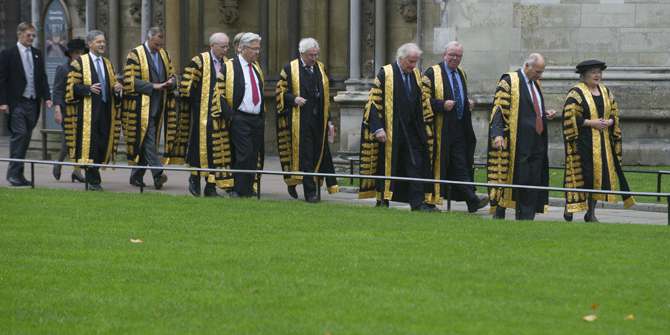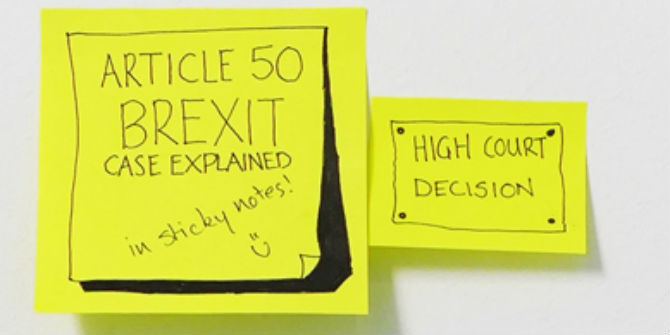 Will the European Court of Justice get involved in the Supreme Court’s deliberations about Article 50? It’s quite possible, says Steve Peers. He explains why and how the justices might decide to seek a ruling from the ECJ. The question of whether Article 50 can be revoked is key: if it is reversible, Brexit wouldn’t necessarily lead to the removal of rights conferred by Parliament.
Will the European Court of Justice get involved in the Supreme Court’s deliberations about Article 50? It’s quite possible, says Steve Peers. He explains why and how the justices might decide to seek a ruling from the ECJ. The question of whether Article 50 can be revoked is key: if it is reversible, Brexit wouldn’t necessarily lead to the removal of rights conferred by Parliament.
The High Court’s ruling requires the government to obtain approval from Parliament if it wishes to trigger ‘Article 50’ – the process of withdrawing from the European Union. This short post won’t focus on the national constitutional law issues, but on the process of possible involvement of the EU courts in Brexit disputes.
The government has announced its intention to appeal the ruling in the Supreme Court. Some have suggested that the case might then be ‘appealed’ to the ECJ, but this misunderstands the judicial system of the European Union. There is no ‘appeal’ from national courts to the ECJ. Rather a national court may suspend proceedings and ask the ECJ some questions relating to EU law that the national court believes it needs the answers to. After the ECJ gives the answers to those questions, the national court resumes its proceedings and gives its judgment in light of them. The ECJ normally takes about 16 months to give a ruling, although it could (and probably would) fast-track a case raising fundamental questions about Brexit.

What EU law questions arise in this case?
The obvious one is whether a notification to leave the EU under Article 50 of the TEU can be revoked once it is given. This is relevant because at the heart of the UK case is a dispute about the ‘royal prerogative’, ie the underlying powers of the UK executive. The royal prerogative allows the executive to conduct international relations, including decisions relating to international treaties. But prior case law makes clear that the prerogative cannot extend to taking away rights conferred by Parliament. The High Court has ruled that this is what would happen if the executive invoked Article 50, since rights are conferred by the European Communities Act.
Yet logically if an Article 50 notification is revocable, then the decision would arguably not as such necessarily lead to the removal of rights conferred by Parliament. Only the subsequent failure to revoke it would. The High Court assumed in its judgment that the notification was not revocable, but that’s only because the parties agreed on this. The claimants agreed that an Article 50 notification was irrevocable because otherwise it would have weakened their case. The government agreed, perhaps because it would have been politically awkward to argue the opposite.
But it’s not up to parties in a national proceeding to decide on what the correct interpretation of EU law is. Article 267 TFEU says that final national courts must send questions of EU law to the ECJ if necessary to give judgment. So the Supreme Court may decide that it wants to have this question answered.
The revocability of Article 50 is not just an issue in this litigation. It’s a broader political issue, since some politicians would like there to be another referendum before the UK fully leaves the EU, once the public knows the terms of exit. That’s only a feasible suggestion if it is possible to revoke an Article 50 notification once it’s made, given that the EU refuses to discuss the terms of exit with the UK until that notification is made.
What if the Supreme Court decides not to refer to the ECJ – is that the end of the matter? Not quite. Since the ECJ judgment in Kobler, it’s established that a Member State can be liable in damages if its supreme court gets EU law wrong without asking the ECJ questions about it. So individuals could go to a lower UK court claiming damages on this basis, and the lower court might deem it necessary to clarify the point by asking the ECJ about revocability, perhaps ordering the government not to make the Article 50 notification in the meantime.
There are several other possibilities for Brexit issues to come before the CJEU. It might be disputed what could be included within the scope of an Article 50 withdrawal agreement, and in particular whether this must be separate from a treaty on the post-Brexit EU/UK relationship. There might be other issues about that latter treaty; some say that the EU legally cannot negotiate one until the UK has fully left. Many say that the UK cannot negotiate trade deals with non-EU countries until it has left.
How could such issues reach the Court?
Article 218 TFEU allows it to rule on future treaties between the EU and non-EU states, so in principle could be used. Any Member State, or the EU Commission, Council or Parliament, could invoke it. A lot of issues arise here, though. Does Article 218 apply to Article 50 at all – since the UK hasn’t left yet, and Article 50 only refers to some parts of Article 218? Is it too soon (for now) to ask about future treaties between the UK and EU, given that notification and negotiations haven’t happened yet?
Alternatively, Article 273 TFEU allows Member States to bring a dispute with each other about issues related to EU law to the CJEU by special agreement. However, the UK would have to be willing to use this provision, and it would have to find another Member State to agree to do so, in order to bring issues before the ECJ.
Other issues may arise about Brexit, even in other Member States’ national courts. An Irish court has already ruled that European Arrest Warrants issued by the UK are still valid in light of Brexit. But this issue is likely to keep arising. UK citizens living in the EU (and vice versa) might want to litigate the argument that they cannot lose their EU citizenship.
In any event, the status of British goods, services and citizens in the remaining EU will doubtless be raised in the EU courts after Brexit, either by means of interpreting EU/UK treaties and/or autonomous EU laws (governing non-EU migration, for instance).
It’s probably only a matter of time before some aspect of the Brexit issue gets decided by the EU courts; and there’s no small irony in that prospect.
Barnard & Peers: chapter 27
This post represents the views of the author and not those of the Brexit blog, nor the LSE. It first appeared on the EU Law Analysis blog.
Steve Peers is Professor of EU Law & Human Rights Law, University of Essex.







So bias at the start
This is yet another insightful post on this blog.
It would seem that until Brexit negotiations are completed, as EU law is now understood, the UK is still in legal terms a member of the EU, so EU law still applies to the UK.
This means there would be no end of possibilities for various parties to appeal to the ECJ from now until the Brexit negotiation process is over.
It would therefore seem logical to hear now from the ECJ how revocable an Article 50 invocation is. This would require the ECJ to prioritise this issue. As this is important not just for the UK, but for other countries considering leaving the EU in the future, the ECJ would be sympathised with by other EU states if it now concentrated on this issue.